Steps to Get Your Financial Life in Order
We all want to feel like our lives are in order, and that is especially apparent when things like the coronavirus show us how little we can control.
One thing you can control, however, is improving your financial situation. That was the subject of a recent article on thebalance.com.1 The following highlights the steps noted in the article to help obtain financial order.
The first thing you need to do when it comes to getting your finances in order is to do a thorough examination of where your finances are at right now. Calculate your net worth by comparing your assets against your liabilities.
Assets are things like bank accounts, stocks, mutual funds, retirement accounts, and real estate. Don’t include your home or your automobile in your assets unless you’re planning to sell them. Conversely, your liabilities are your credit cards and other debts. Don’t include your mortgage in this category unless it was included in your assets.
It should only serve as a reminder to bring a little more order to your overall financial plan. With that in mind, you can set financial goals. Drafting a list of real goals and then having the discipline it takes to meet them is a powerful financial step. If you’re one of the millions of Americans whose net worth is at zero or is negative, perhaps your goal should be to get out of debt as quickly as possible. By spending less and getting out of debt, you open a whole new financial world for yourself.
We can’t truly understand our financial habits until we craft a comprehensive budget. Start by listing your income and expenses. Compare a handful of months to see where you’re consistently spending your money. Then simply subtract your expenses from your income. What do you find?
If the amount is negative, or simply too close for comfort, consider ways you might be able to cut back on your spending. If you’re left with a number that’s comfortably in positive territory, you might consider building a budget that helps you continue spending appropriately, including additional dollars earmarked for retirement purposes. The zero-based budget, which gives every dollar a task each month, is a good system.
Getting out of debt is something that many Americans should consider. But the idea of really attacking debt can seem daunting. For many people, it’s like staring up at a mountain you know you must climb. But once you’ve climbed it and gotten to the other side, you’ll be enjoying a whole new financial life.
No matter how much debt you’re currently carrying, you probably want to pay off high-interest debt as quickly as possible. Interest can slowly choke the life out of even the best designed financial strategies. For example, someone with a substantial credit card debt could very likely be paying more each month in interest than they’re making on their investments. Ultimately, that’s unsustainable.
All of this may help you get closer to arguably the most important step: saving money. You could make a strong case that nothing secures your finances better than diligently saving money. That could be in an emergency fund for unexpected short-term needs, or retirement accounts for long-term income. By saving money now, you’ll better position yourself to address things like future home and auto down payments, a child’s college tuition, or unexpected expenses and investment opportunities.
Taking control of little things can make you feel better about the big things. Contact your financial services professional to learn more about how you can take control of your financial picture.
1 https://www.thebalance.com/plan-to-turn-around-your-finances-4119172

